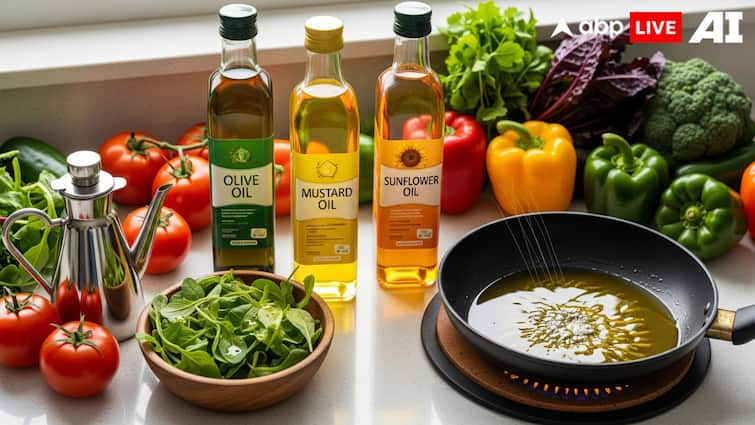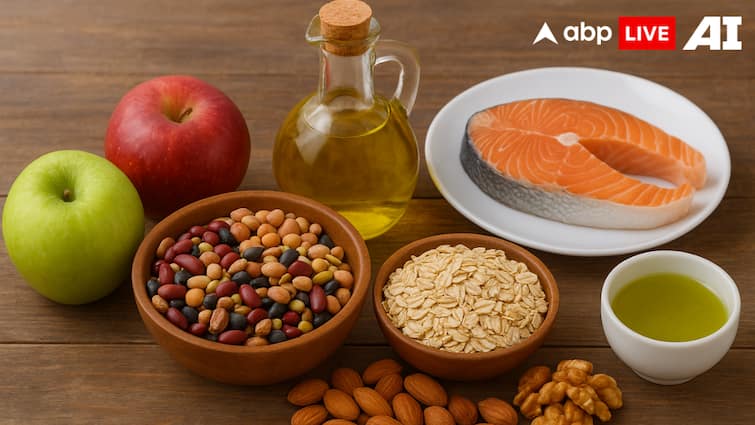{By Dr Mukesh Goel}
In every Indian kitchen, the preference for cooking oil is deeply personal, passed down through generations, influenced by regional cuisines, and has been a family tradition for years. But in recent times, with cardiovascular diseases emerging as the number one cause of death in India, the most asked question is what oil works for the healthy heart, and in the past few years, it has become a more pressing issue. Olive oil, mustard oil, and sunflower oil are the most commonly used, each with its strengths and weaknesses. To make an informed decision, it is essential to understand what science has to offer about these oils and how to incorporate them into a heart-healthy lifestyle.
According to the National Library of Medicine, Olive oil, mustard oil, and sunflower oil each offer heart-health benefits, but current research most consistently supports olive oil for reducing cardiovascular risk, while mustard oil shows promise for cholesterol and vascular function and high-oleic sunflower oil may help manage blood lipids
ALSO READ: The Silent Shift: Why India’s 20s And 30s Have Become The New Risk Zone For Cancer
Olive Oil: The Mediterranean Diet
In our minds it is embedded that olive oil has been the celeb of heart-healthy diets, thanks to the large part to the legendary Mediterranean diet. Extra virgin olive oil, in specific, takes center stage with its rich store of monounsaturated fats and polyphenols, potent antioxidants that suppress inflammation and keep the blood vessel lining intact.
Even the American Heart Association have confirmed that olive oil reduces LDL cholesterol the “bad” cholesterol that contributes to artery clogging while keeping or even increasing HDL, the “good” cholesterol that removes fat from the blood.
Its anti-inflammatory properties also help against atherosclerosis (artery hardening), which is one of the significant cause factors for heart disease. Olive oil is at its best when used uncooked, for example, in salad dressings, for marinating, or for drizzling over steamed vegetables. The negative aspect is that the comparatively low smoke point of extra virgin olive oil makes it a less suitable option for deep frying, a frequent process in Indian cuisine. It is also costlier than most other oils, and thus unsuitable for everyday use in most Indian households
Mustard Oil: India’s Ancient Superfood
Mustard oil has been the backbone of Indian cooking, especially in the eastern and northern regions, for centuries. It is rich in monounsaturated fats and alpha-linolenic acid (ALA), a vegetable-based omega-3 fatty acid that helps maintain healthy hearts. Omega-3s lower levels of triglycerides, keep irregular heartbeat from developing, and reduce blood clot risk, all of which are important in lowering cardiovascular risk.
Another advantage of mustard oil is its relatively healthy omega-3 to omega-6 fatty acid ratio compared to most refined oils, which are disproportionately rich in omega-6. Additionally, its natural spiciness is derived from allyl isothiocyanate, a molecule with antimicrobial and anti-inflammatory properties. It has been observed that mustard oil contains a high smoke point and is thus best used for frying, sautéing, and even pickling. It goes wonderfully with Indian spices, adding flavour and nutrition.
Sunflower Oil: The All-Rounder
Sunflower oil is one of the most popular cooking oils throughout India, and it has a light consistency and neutral flavor. It is also high in vitamin E, a powerful antioxidant that guards cells against oxidative stress, and is made up of a favorable ratio of polyunsaturated fats, which reduce cholesterol levels when eaten moderately.
Yet, sunflower oil contains high amounts of omega-6 fatty acids. While the body does need omega-6, excessive amounts without sufficient omega-3 consumption can shift the balance toward inflammation, thereby increasing the risk of heart disease. Sunflower oil, then, is a double-edged sword: healthy when consumed in moderation, but problematic if the sole oil consumed.
The Question Is Which Oil Is The Best?
The reality is, however, that there is no one “best” oil for heart health. Each of them has its strong points: olive oil provides antioxidants and anti-inflammatory effects, mustard oil offers omega-3 fatty acids and a high smoke point, and sunflower oil provides vitamin E and versatility.
To maintain optimal heart health, it is recommended that individuals rotate through one variety. Olive oil for continental and salad use, mustard oil for Indian stir-fries and curries, and the occasional sunflower oil for frying give you all the advantages of three without their own weaknesses.
It is extremely important to remember that moderation is key. Even healthy oils are calorie-rich, and their overuse can result in weight gain and create a significant risk factor for heart disease. Combining healthy fats with a well-balanced diet that includes fruits, vegetables, whole grains, pulses, and regular physical exercise is the most effective way to maintain a healthy heart.
Selecting the ideal oil isn’t simply a choice; it’s an investment in one’s overall well-being. Olive, mustard, and sunflower oils all play a significant role in promoting a healthier heart when used wisely and in moderation. Instead of seeking out the “perfect” oil, one should emphasise variety, moderation, and an overall healthy heart lifestyle. After all, it’s not just what you cook with, but also how you live, that maintains the power of your heart and overall well-being.
The author, Dr. Mukesh Goel, is a Senior Consultant, Cardiothoracic and Cardiovascular Surgery, Heart and Lung Transplant Surgery, at Indraprastha Apollo Hospitals.
[Disclaimer: The information provided in the article, including treatment suggestions shared by doctors, is intended for general informational purposes only. It is not a substitute for professional medical advice, diagnosis, or treatment. Always seek the advice of your physician or other qualified healthcare provider with any questions you may have regarding a medical condition.]
Check out below Health Tools-
Calculate The Age Through Age Calculator



